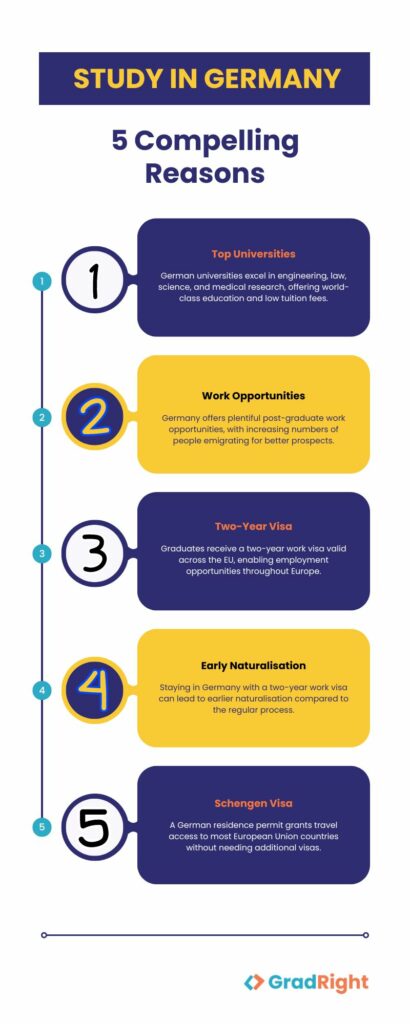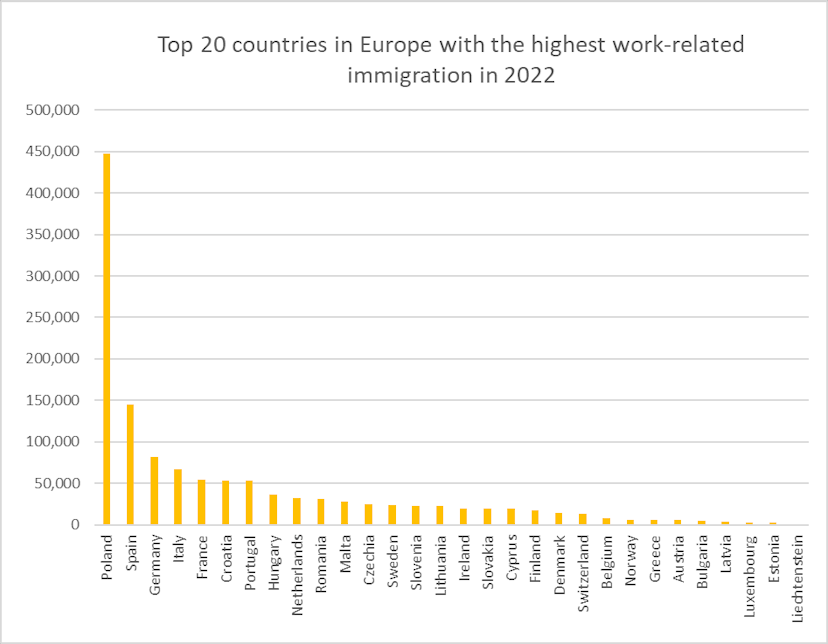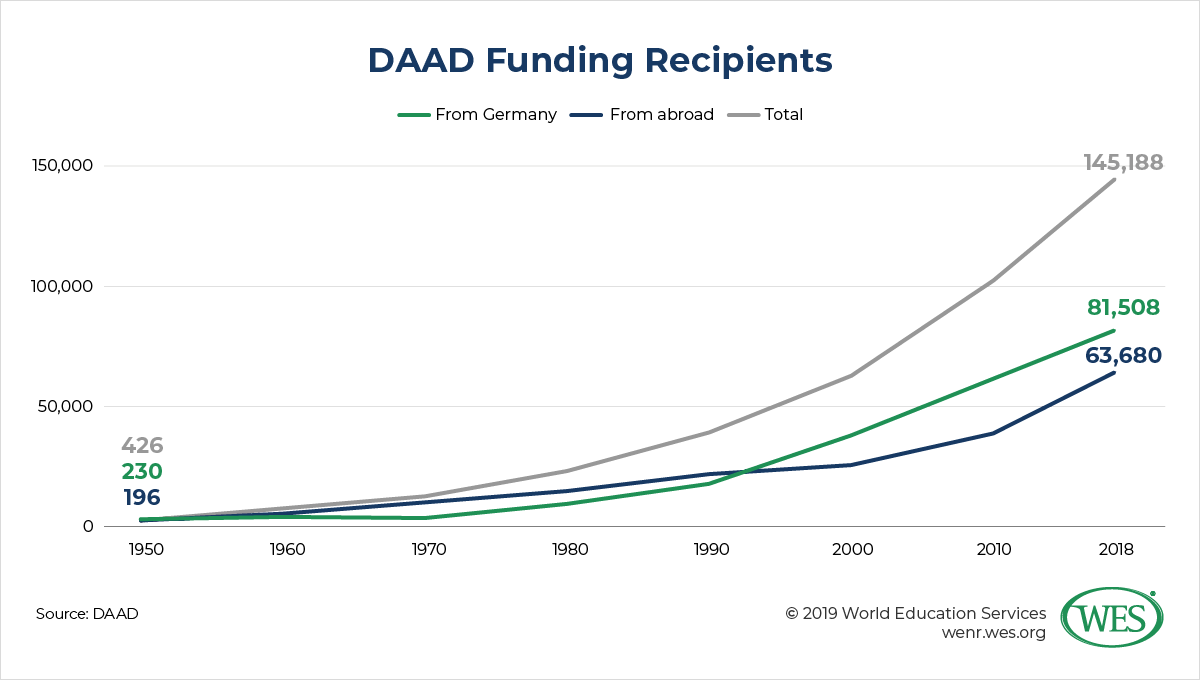Germany is a top destination for international students, and for good reason.
A major reason is that the cost of studying in Germany is surprisingly affordable. It is even more attractive when you compare the cost to that for other European countries.
But how much money will you need to study in Germany, realistically? This guide will break down the costs for Indian students like you.
We unpack all the costs such as tuition fees, living expenses, associated hidden costs, and more.
And without any further ado, let us get right into it.
Cost of studying in Germany
Tuition fees make up the majority of overseas university costs. Most countries charge international students extra to study in their universities. That said study in Germany from India is quite viable for students, for one main reason.
Public (government-run) universities in the country do not charge tuition fee. This means that as an Indian, you won’t have to pay high tuition fees to study in Germany.
German public unis (except Baden-Württemberg) charge only around 350 euros per semester. In fact, they don’t even call it tuition — they’re called “semester contributions”.
However, if you go private, the cost of studying in Germany greatly increases. In this case, your tuition alone will range from 5,000 to 20,000 euros per year, depending on your course. But even here, the cost of studying in Germany for international students is lower overall, compared to universities in the USA and UK.
In addition to semester fees, you’ll have living expenses while studying in Germany. In fact, the living cost would make up the bulk of your expenses during a German degree.
The living cost of studying in Germany will include housing, food, and transport. Also, you’ll need to budget for medical insurance (for the duration of your stay).
Now, don’t worry about how much each costs, we’ll cover living costs a few sections down. So, while there is no tuition fee, you still need to factor in living costs when considering how much money is required to study in Germany.
Cost of studying in Germany for Indian students in 2024
Here is the specific cost of studying in Germany for Indian students.
-
Apostillation
Certain German universities require you to get your documents “attested” or apostilled. This is basically a verification check by the Indian foreign ministry/embassy.
It certifies that you are who you say you are, and that your documents are legitimate.
The good news is that you don’t have to do the process yourself. There are specific agencies in almost every city that can send your documents for apostillation.
This can add about 10,000 rupees to the cost of studying in Germany for Indians (per document). Common documents that universities need to be attested are your birth certificate, 10th and 12th mark sheets, 12th pass certificate, and your university transcript.
-
Blocked Account
The cost of studying in Germany for Indians is increased by needing a blocked account. It might sound strange, so let’s explain. It is a special bank account that foreigners (non-EU ones) need to open in Germany.
Without the blocked account, you won’t be granted a student visa. The purpose is to ensure you have enough money to support your cost of living. The blocked account must have one year’s expenses.
As of May 2024, you need 10,000 euros in the blocked account to approve your visa.
Every year, when you renew your visa, you will need to make a new blocked account or “top up” your old one. At the beginning of every month (from when your program starts), about 850 euros will be deposited into your “everyday” bank account.
The next section is critical because it covers the requirements for studying in Germany. Indians must meet a couple of special criteria to be eligible for German public uni.
Requirements for studying in Germany
-
German language proficiency
To begin pursuing your degree in Germany, you must prove that you speak the language. More specifically, you need to prove that you speak German to a “C1” level.
Additionally, engineering, medicine, and IT students need to have passed the “C2” exam. You must have passed the exam no more than 356 days before your course is going to begin.
In India, the most common way to prove this is by registering for online classes with the Goethe Institut. Both the German embassy and German universities accept Goethe exam reuslts to process your application.
-
13 years of education
The German government does not consider the system of 12 years of education, used by CISCE (ISC), CBSE, or state boards to be enough for entry to university. As a result, one needs 13 years of education to begin university in Germany.
This is called the (Abitur). The most common way for foreigners to gain their Abitur is to attend a StudienKolleg in Germany. This is like a mini college foundation year, where you learn German and integrate into social life.
A great benefit is that StudienKolleg classes teach you industry-specific german. Thus, people who go to study engineering would already be familiar with their industry terminology.
This gives them an edge over foreigners who join directly. The StudienKolleg does add to the cost of studying in Germany for Indians. However, the only alternative is a one-year diploma, to add that extra 13th year of education, which is mandatory for you to be eligible to study in Germany.
Of course, this is only for undergraduate programs. If you are planning to study a master’s in Germany, this point is not relevant for you.
-
Two bank accounts
To study in Germany, you will need two bank accounts. One of these must be the blocked account, and the other one is where the blocked funds are paid each month.
Thus, one bank can be international, but at least one needs to be with a German bank. Your blocked account is only accepted if it is from a German bank.
-
Letters of Recommendation
For master’s programs, German universities usually ask for three letters of recommendation. If you cannot provide three from work, then one work and two academic references are accepted.
However, one must be a professional (employer) reference. German universities clearly state that they will prioritise candidates with work experience.
With those four basic requirements out of the way, let us talk about the cost of living in Germany.
Cost of living in Germany
Here are the major costs of studying in Germany that go beyond the costs of education. These include all your living expenses.
-
Housing
Your biggest expense in Germany is going to be your accommodation.
Student dorms are generally the cheapest option, costing between 350 and 500 euros per month.
Shared flats are another great option (called “Wohngemeinschaft” in German). These offer more creature comforts, and cost between 400 and 600 euros per month.
Lastly, the most expensive option is a private apartment, which will run you upwards of 900 euros each month.
-
Groceries
The next major expense that you have is groceries and food. Your bill will of course depend on the amount that you eat out and where you source your fresh meat, fruit and veg.
For the most part, groceries in Germany are affordable, and you wont need to budget more than a couple hundred euros per month for them. Local supermarkets are very accessible, and there are international chains scattered around the country as well.
-
Transport
Lastly, you have transport. Germany issues students with a schengen visa, which you can use to travel around Europe. Inter-country travel within the Schengen is relatively affordable, both by air and by rail.
However, travel within the city is usually covered by a student transport card. This is (usually) not an additional expense, and is covered within your semester contribution.
Most cities in Germany are well connected by rail, bus, and tram. Taxis however are pricey, just like they are everywhere else in the world.
Next, let’s look at your visa process, cost, and timeline.
Once you add these to your budget, you’ll know exactly how much it costs to study in Germany from India.
German study visa costs
Though the student visa is issued by VFS Global, you’d still need to pay an application fee of 60 euros for processing.
Additionally, if your application is through the German embassy (this is only allowed for special cases), you’d be paying around 200 euros.
Also, factor in that flights to Berlin are usually cheaper than ones to Frankfurt. Even so, your flights generally cost about 50,000 INR each year (for one round trip).
Of course, that depends on season and airline, but you get the idea.
Next up, let’s look at some underappreciated benefits that studying in Germany will net you.
Why choose Germany for higher studies?
Here are the top reasons why people choose to study in Germany, other than the low tuition fees.
- German universities are considered leaders in their respective industries. For programs in engineering, law, and science, they are the best in the world. And of course, Germany is at the forefront of medical research and technology. It is also one of the few countries where you can study MBBS at a low cost.
- Germany issues all residents with a schengen visa, which allows travel to most of the European union. You don’t even need a visa for these countries — simply show your German residence permit, and you’ll be allowed in.
- Post-graduate work opportunities are also plentiful in Germany — for now. Who knows how long this period will last, especially with the number of people emigrating there. Take a look at the graph below. And note, the numbers are only going to rise, so get in while you can.
- You get a two-year work visa after completing a master’s in Germany. This allows you to work anywhere in the EU.
- Remember the point above about the two-year work visa? It is valid across most of the EU. However, if you stay in Germany for those two years, you could naturalise up to one year earlier than with the regular channel.

Now that you’ve understood the benefits and cost of studying in Germany, let’s look at funding your degree.
Scholarships and financial aid for German universities
Owing to the low public tuition fees (semester contributions) in Germany, scholarship options are few and far between. This doesn’t mean that they don’t exist though.
Here are the most common scholarship options for Indian students in Germany.
This is the biggest scholarship program in Germany. The DAAD offers various options for undergraduate, postgraduate, and Ph.D. studies. Coverage varies but often includes monthly stipends and health insurance. Deadlines typically fall between February and July.
These are funded by the European Union. They are to support specific joint Master’s degree programs offered by universities across Europe, including Germany. Check individual program websites for deadlines.
This foundation supports talented postgraduate and Ph.D. students. It looks at leadership potential and social responsibility. Scholarships cover monthly stipends and health insurance. Application deadlines are usually around March.
This foundation awards scholarships to students committed to democracy, social justice, and ecological sustainability. Funding includes monthly stipends, health insurance, and program-related costs. Deadlines are generally in early February.
And even if you do not manage to get a scholarship, the living expenses in Germany can easily be covered with an education loan. But which education loan should you choose? There are so many providers in India, finding a decent deal becomes a nightmare.
Fortunately, you can now use tools like FundRight to help you find the best-fit education loan for you. The education loans provided through FundRight cover the entire cost of studying in Germany for international students. Save up to 23 lakhs on your education loan when 15+ top lenders compete for your loan and offer you the best possible terms. Find your best offer today.

Lastly, before we end, let’s look at the top universities and courses to study in Germany.
Top universities and courses to study in Germany
Germany has several universities that are very well-respected globally. Here are the best ones for Indian students.
For people who want to break into investment banking, or finance in general, the FSFM will be top of their list.
For that, the FSFM MSc Finance is one of the most coveted degrees in the industry. Moreover, the contacts you make here will last lifetimes.
The school also offers a very popular MBA course, but that does get somewhat expensive. The campus is one of the best in Europe, having been built at the cost of some 100 million Euros.
The place has a strong international community, and is specifically popular among Indians.
RWTH Aachen University is a famous technical university in Germany. It’s known for its excellent reputation in the fields of science and engineering. Mechatronics is a very popular course there, with graduates mostly working in medical fields. The university is known to be the forerunner in medical/ surgical automation.
Aside from that, Aachen (the city) was built around the university and is quite a historic city. The university ranks 9th in Germany and 99th globally. It has a huge community of international students (and faculty) who come from all over the world.
Often known by its moniker, “TUM”, the German name for this amazing uni is “Technische Universität München”. Again, it is one of the leaders in the science, engineering, and IT spaces, and invites people from all over the world to apply.
Additionally, TUM offers dozens of programs that are taught entirely in English, so even if your German is weak, you’ll still do just fine.
TUM is ranked 37 by QS University world rankings. This can be a big advantage when you’re looking for a job after graduation. The most popular programs at TUM are Mechanical Engineering, Electrical Engineering, Computer Science, Medicine, and Mathematics.
TUM offers a good amount of financial aid for science and medical students. This could allow you to study MBBS in Germany at low cost, and can also reduce the cost of studying engineering in Germany.
LMU is short for “Ludwig-Maximilians-Universität”, and is also located alongside TUM in the city of Munich. LMU has dedicated offices for international students, and protocols to help you settle into the city.
Their German life integration module is praised by 100% of people who take it. LMU is a master of all trades when it comes to courses.
They offer everything from humanities and natural sciences to IT and engineering. They also have a solid base for law and medicine courses. LMU is ranked second in Germany, and 54th worldwide.
The last option on our list is Heidelberg University. Ranked third in Germany and 47th worldwide, it is an excellent option for your higher studies. Their best courses are in mathematics, physics, and chemistry. It is worth mentioning that it is the oldest university in Germany.
Other great courses can be found in medicine, social sciences, and humanities. You’ll also probably have a gala time as the city is genuinely a melting pot of cultures.
Heidelberg is, at its core, a very international city, so you’ll have no problem adjusting there.
These are just the top five options in our books. Germany has dozens of top-tier universities for you to choose from. It’s easy to get lost among the many school choices, program offerings, and marketing material issued by them all.
That is why we have built our SelectRight platform.
It helps you cut the clutter, and get the program that is the best-fit for your needs.
Also, you minimise the risk of a bank rejecting your loan application when you use SelectRight. Don’t gamble on your future. Find your perfect university with SelectRight. Start exploring now.
Clutter, or SelectRight? You choose.
And with that, we come to the end of this article on the cost of studying in Germany. We hope you found it useful, and we’ll see you in the next one.
Frequently Asked Questions
-
How much does it cost to study English in Germany?
If you find a public university with an English program, there won’t be tuition fees. You’ll likely pay semester fees of €100 to €350 to cover administrative costs. Private institutes have their own tuition fees, ranging from €173 (around $200) per week for a basic course.
-
How much does it cost to study physiotherapy in Germany?
This is a medical procedure, so the cost depends on your health insurance. If you have public insurance, you might have a small co-pay. However, most of the cost will be covered. For private coverage, check with your provider for their policy.
-
How much does a nerve conduction study cost in Germany?
Public universities are the most affordable option. Expect semester fees of €100 to €350, with additional program fees depending on the university. Also, a private university in physiotherapy starts at around 5000 Euros.
-
How much does it cost to study MBA in Germany?
MBA’s in Germany are usually from private universities. Most MBAs offered here have tuition ranging from €5,000 to €20,000 per year, or even higher for prestigious programs.
-
How long will my visa take?
The processing of your German study visa is very swift, under a month. However, the appointment at VFS global can be a pain point. Book as early as possible, ideally as soon as you get your offer of admission. Currently, VFS appointments are taking 90-110 days to be scheduled at the time of writing.



















